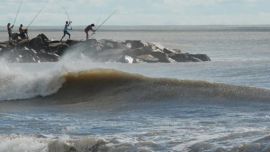Tomorrow Venezuela is scheduled to be voting in elections which could make the second quarter-century of this millennium a very different story to the first. Quite understandably, nobody is looking much beyond tomorrow until removal of the nagging doubts that the cornered Nicolás Maduro regime will finally prevent the election from being held at all or else derail its verdict via massive fraud. And once beyond that hurdle, the immediate transition becomes the next concern – can a relatively smooth transfer of power between two totally regimes be somehow brokered, as achieved by Chile in 1990, without the sacrifice of legitimate principles of justice quite apart from desires for revenge? But the need to look deeper into the future is no less urgent.
The costs and problems of transition are widely underestimated – and it is at this point that we already start talking about Argentina as well as Venezuela since the shift from a state-run economy to a free market (a problem shared by both countries at opposite ends of South America) can be as drastic and as complex as from dictatorship to democracy. Beyond doubt that Venezuela has it worse, quite simply because it has it worse than just about anybody else with even more millions fleeing Bolivarian rule than such war-torn nations as Syria or Ukraine – thus the Gross Domestic Product of this erstwhile oil-rich economy has crashed by over 80 percent in the past decade, as against almost a third of GDP for Ukraine since Vladimir Putin invaded – but Argentina shares the same problem in its own way (along the lines of Leo Tolstoy’s Anna Karenina principle of unhappy families).
Critics and defenders of the Javier Milei administration alike continuously underestimate the truly disastrous inheritance accumulated in this century so far. An error almost impossible to avoid on the part of the government at least because one thing is blaming that grim legacy (no shortage of that) and quite another concluding its rectification to be a mission impossible in the space of one or even two presidential terms because in the latter case there would be no point in seeking and assuming the presidency – the mere fact of entry into office presupposes a belief in engineering a turnaround which may or may not be justified.
That uncertainty faces Argentina and its libertarian rulers now while awaiting Venezuela should the expected change of regime transpire as from tomorrow. Argentine voters would never have turned to an unkempt, foul-mouthed, eccentric economist if their country were not at a dead end but its problems bear no comparison to Venezuela – that 80 percent shrinkage, a collapsed oil industry, several years of hyperinflation experienced instead of around the corner as here, the total lack of a national currency, a disarray of relative prices leaving wages far behind and all the other makings of a failed state. A new Caracas government would not only have to reverse this cataclysmic past amid great expectations but also tackle these problems in a future potentially depriving them of their main asset in the next quarter-century – the objective of net zero carbon emissions by the year 2050 set at last year’s COP28 summit aims at reducing fossil fuels from 80 to 20 percent of global energy sources. In contrast, Vaca Muerta shale is central for Argentina but not the only game-changer – other resources like lithium and other metals, a highly productive agriculture and knowledge industries all offer bricks for rebuilding.
All that is not to place Venezuela beyond hope. The problems are huge and the expectations high but the bar extremely low with a rebound soon generating a positive momentum – Argentina’s experience at the start of this century – and a human capital up to the task, at least judging from the over 200,000 hard-working Venezuelans who have landed up here. Yet nor is a renewed Venezuela “condemned to success” in the words of Eduardo Duhalde, the caretaker president commencing Argentina’s recovery at the start of this century.
Hard to say anything more about Venezuela’s uniquely awful experience at this distance, far less forecast its future – the most which can be done at this stage is to share Argentina’s history of transitions. The transition from
dictatorship to democracy under the Radical Raúl Alfonsín was more successful in bringing the juntas to account for their misdeeds than in dealing with the consequences. His Peronist successor Carlos Menem in turn needed a transitional period of over 20 months to control hyperinflation via convertibility – a cure widely perceived as proving worse than the disease because the country did not match the parity with the United States which existed between the peso and the dollar. The resulting meltdown saw this new century off to a fresh start.
With Duhalde doing most of the transitional dirty work, Kirchnerism was thus handed a pretty clean slate alongside a global commodity boom but chose to put the wrong writing on the wall – the twin fiscal and trade surpluses converted into deficits, capital controls, a disarray of relative prices stemming from subsidised public service billing, infrastructure stunted by crony capitalism corruption and a foreign policy mixing isolationism with ideological alliances. Two attempts have been made in this century to exit this dead end, both underestimating the challenge – one as from 2015 under Mauricio Macri which proved to be its own blind alley and the one in progress now with the jury still out.
These two renewal bids adopted different approaches to a common problem. Macri unified the exchange rate in his first week but adopted fiscal gradualism in order not to antagonise his electorate – Milei embarked on fiscal shock to balance his budget from the word go but on the monetary front is taking forever to exit the cepo controls. Macri contracted an unpayable debt with the International Monetary Fund, thus foreclosing that solution for Milei – the melancholy lesson for Venezuela here is the extreme difficulty of overcoming crisis situations on this scale without something akin to the Marshall Fund. Macri was the business establishment candidate par excellence who nevertheless placed the “red circle” in the dock with his anti-corruption trials – Milei is the anti-caste firebrand apparently indifferent to corruption and cosy with vested interests (without giving them public works, however).
A new Venezuelan government should also beware of the libertarian drive to reduce politics to “all or nothing” polarisation, seeking to absorb Macri’s PRO while further atomising the various fragments lying between them and Kirchnerism. When economic turnaround is so fraught with risk in the case of both countries, there is a huge danger in leaving Kirchnerism here and Maduro in Venezuela as the only alternatives should success elude them – a constructive opposition is a must for both countries. In Argentina’s case at least, “all or nothing” is not realistic, partly because next year’s midterms will leave half the lower house and two-thirds of the Senate unchanged with no chance of an overall majority and partly because a third of the electorate continues stubbornly clinging to the various bits and pieces lying between Milei and his Kirchnerite predecessors, despite their distance from power.
By all means feel sorry for a Venezuela facing so stern a test but do not imagine we inhabit so different a universe here.
--TIMES




















Comments